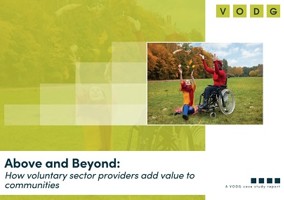A points-based immigration system will create instability in the social care labour market and could be “catastrophic”, representative bodies warned today.
Voluntary Organisations Disability Group (VODG) has said it is extremely concerned about the government's points based immigration proposals as they might mean that no one can enter the country to take a carer role at a time when the sector is “chronically short of staff”.
The group has said it is vital that the sector is sufficiently resourced to ensure social care providers are able to recruit and retain its workforce.
The government today announced plans for a points-based system for awarding visas to allow people to work in the UK. Under the new system, EU migrants would be treated the same as those from the rest of the world.
Applicants must have a job offer from an “approved employer” at an “appropriate skill level” and speak English. That will get an applicant to 50 points, but they must have 70 points to be eligible for a visa. The final 20 points are gained if the applicant will earn at least £25,600 or have certain qualifications or skills.
'Hugely concerning proposals by government will only exacerbate workforce shortages'
Rhidian Hughes, chief executive of VODG, said: “These hugely concerning proposals by government will only exacerbate workforce shortages in social care. Employers are already struggling to recruit and retain staff due to chronic underfunding in the sector.
“Central government now needs to significantly strengthen investment in the sector. Without that investment we should be in no doubt that in some geographical areas where organisations are struggling to secure staff, these proposals will signal the end of essential social care services.”
VODG said that for many providers, retaining adequate staffing levels is a significant challenge for a number of reasons. The increasing complexity of the care needs of people who use services is one of these reasons, as “care work is becoming more skilled and specialised”. It comments that the government's proposals fail to recognise this.
VODG members work with around a million disabled people, employ more than 85,000 staff, and have a combined annual turnover in excess of £2.8bn.
'Exacerbates challenges'
The Charity Finance Group said the move exacerbates existing challenges and called for investment in local government.
Richard Sagar, policy manager at the Charity Finance Group, said: “With no specific route for migrants the government deems as low-skilled, the newly-announced immigration system will be of great concern to the sector.
“CFG-commissioned research has found that the majority of migrant workers in the charity sector are employed in either social or residential care. With skills shortages and a squeeze on income already reported in social and residential care, this could exacerbate the difficulty our members are already finding in filling roles.
“Unless government makes significant investment in local government at the upcoming Spending Review, this could be catastrophic for charitable social care providers in the UK.”
'Substantial challenges'
Care England, the leading representative body for small, medium and large providers in England has also expressed its concern.
Professor Martin Green, chief executive of Care England, said: “The approach being taken by the Government to migration post Brexit will put significant pressures on the social care system. If we are going to compete with other employers, we will expect our biggest customer HM Government to pay significantly increased amounts for care services, so that we can give the salaries and benefits that our staff so richly deserve”.
Nadra Ahmed OBE, executive chair of the National Care Association, said: “This system will bring with it substantial challenges for our sector as we are currently facing a call for more social care not less, and yet providers are being forced to consider exiting the market due to the workforce shortages and funding issues.
“Clearly, government are either not listening or closing their eyes to the fact that social care needs to be on that shortage occupation list and there needs to be greater investment in the sector to support the growth of a domestic workforce strategy. Their ideas around social care amount to a leaky bucket and don’t hold up.”
|
Related Articles











